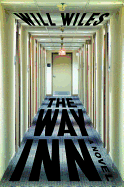
Will Wiles used architectural space as a witty metaphor for personal and emotional control in his first book, The Care of Wooden Floors. Space--personal, contractual, digital, and designed--also plays a key role in The Way Inn, where "commercial navel-gazing and solipsism" becomes a philosophical rumination about the individual "black boxes" that corporate culture and consumerism create.
Neil Double is a conference surrogate, a guy who revels in the mundane details and generalities of convention life, serving as a stand-in for clients who'd rather not attend. At a conference about conferences, he meets Tom Laing, a potential client who turns out to be the event's organizer. Tom exposes Neil's secret and Neil becomes a marked man, losing access to his livelihood and his controlled life of "persuasive anonymity and the license that comes with that"--until he encounters the mysterious red-headed Dee. Her connections to the Way Inn and its own sort of controlled uniformity launch Neil on a slow-moving, Kafkaesque ride through hotel and corporate life, challenging his perceptions and disrupting "the cosmos of tiny details that make up everyplace mundanity," forcing Neil to confront the bitter truth about humanity's artificial spaces.
Wiles's keen observations about the anonymity of conference life provide a clever vehicle for Neil's work as a surrogate and the personality struggles that ensue. The Way Inn also serves as a cautionary tale in this age of information gathering, where the contents of one's life are just an Internet search away. One thing seems likely: readers won't look at chain hotels in quite the same way again. --Nancy Powell, freelance writer and technical consultant

